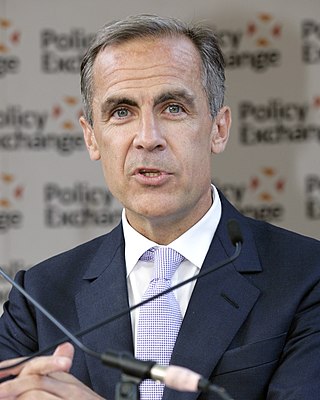Related Research Articles

The Canadian dollar is the currency of Canada. It is abbreviated with the dollar sign $. There is no standard disambiguating form, but the abbreviations Can$, CA$ and C$ are frequently used for distinction from other dollar-denominated currencies. It is divided into 100 cents (¢).

A reserve currency is a foreign currency that is held in significant quantities by central banks or other monetary authorities as part of their foreign exchange reserves. The reserve currency can be used in international transactions, international investments and all aspects of the global economy. It is often considered a hard currency or safe-haven currency.

The Canadian Imperial Bank of Commerce is a Canadian multinational banking and financial services corporation headquartered at CIBC Square in the Financial District of Toronto, Ontario. The Canadian Imperial Bank of Commerce was formed through the 1961 merger of the Canadian Bank of Commerce and the Imperial Bank of Canada, in the largest merger between chartered banks in Canadian history. It is one of two "Big Five" banks founded in Toronto, the other being the Toronto-Dominion Bank.

The Bank of Montreal is a Canadian multinational investment bank and financial services company.

Toronto-Dominion Bank, doing business as TD Bank Group, is a Canadian multinational banking and financial services corporation headquartered in Toronto, Ontario. The bank was created on February 1, 1955, through the merger of the Bank of Toronto and The Dominion Bank, which were founded in 1855 and 1869; respectively. It is one of two Big Five banks of Canada founded in Toronto, the other being the Canadian Imperial Bank of Commerce. The TD Bank SWIFT code is TDOMCATTTOR and the TD institution number is 004.

The Bretton Woods system of monetary management established the rules for commercial relations among the United States, Canada, Western European countries, and Australia among 44 other countries after the 1944 Bretton Woods Agreement. The Bretton Woods system was the first example of a fully negotiated monetary order intended to govern monetary relations among independent states. The Bretton Woods system required countries to guarantee convertibility of their currencies into U.S. dollars to within 1% of fixed parity rates, with the dollar convertible to gold bullion for foreign governments and central banks at US$35 per troy ounce of fine gold. It also envisioned greater cooperation among countries in order to prevent future competitive devaluations, and thus established the International Monetary Fund (IMF) to monitor exchange rates and lend reserve currencies to nations with balance of payments deficits.
Big Five is the name colloquially given to the five largest banks that dominate the banking industry of Canada: Bank of Montreal (BMO), Bank of Nova Scotia (Scotiabank), Canadian Imperial Bank of Commerce (CIBC), Royal Bank of Canada (RBC), and Toronto-Dominion Bank (TD).

Pamela Wallin is a Canadian senator, former television journalist, and diplomat. She was appointed to the senate on January 2, 2009, where she initially sat as a Conservative.

BMO Bank, N.A. is an American national bank that is headquartered in Chicago, Illinois. It is the U.S. subsidiary of the Toronto-based multinational investment bank and financial services company Bank of Montreal, which owns it through the holding company BMO Financial Corporation. In September 2023, it was the 8th largest bank in the United States by total assets.

Abby Joseph Cohen is an American economist and financial analyst on Wall Street. She is a professor of business at Columbia Business School. In 2001 she was named one of the 30 most powerful women in America by Ladies Home Journal, and she has been named as Barron's 100 most influential women in finance every year since the list's inception. She worked at Goldman Sachs for many years, working as the firm's Chief Investment Strategist prior to March 2007 and then leader of its Global Markets Institute, before retiring from this role in 2017.

BMO Field is an outdoor stadium located at Exhibition Place in Toronto, Ontario, Canada. Constructed on the former Exhibition Stadium site and first opened in 2007, it is the home field of Toronto FC of Major League Soccer (MLS) and the Toronto Argonauts of the Canadian Football League (CFL). BMO Field is owned by the City of Toronto and managed by Maple Leaf Sports & Entertainment, which owns both Toronto FC and the Argonauts. The stadium's naming rights are held by the Bank of Montreal, which is commonly branded as "BMO".

The Bank of Canada is a Crown corporation and Canada's central bank. Chartered in 1934 under the Bank of Canada Act, it is responsible for formulating Canada's monetary policy, and for the promotion of a safe and sound financial system within Canada. The Bank of Canada is the sole issuing authority of Canadian banknotes, provides banking services and money management for the government, and loans money to Canadian financial institutions. The contract to produce the banknotes has been held by the Canadian Bank Note Company since 1935.
F. Anthony Comper, known as Tony Comper, is a Canadian banker. He served as president and chief executive officer of Bank of Montreal, which currently operates under the brand BMO Financial Group, and retired from that position on March 1, 2007.

Banking in Canada is one of Canada's most important industries with several banks being among its largest and most profitable companies.
William Arthur Downe is a Canadian banker who was chief executive officer of Bank of Montreal from March 1, 2007, to October 31, 2017.

Mark Joseph Carney is a Canadian economist and banker who served as the governor of the Bank of Canada from 2008 to 2013 and the governor of the Bank of England from 2013 to 2020. He currently serves as chairman, and head of Impact Investing at Brookfield Asset Management since 2020, and was named chairman of Bloomberg Inc., parent company of Bloomberg L.P., in 2023. He was the chair of the Financial Stability Board from 2011 to 2018. Prior to his governorships, Carney worked at Goldman Sachs as well as the Department of Finance Canada.

Olivia Chow is a Canadian politician who has been the 66th mayor of Toronto since July 12, 2023. Previously, Chow served as the New Democratic Party (NDP) member of Parliament (MP) for Trinity—Spadina from 2006 to 2014, and was a councillor on the Metro Toronto Council from 1992 to the 1998 amalgamation followed by Toronto City Council until 2005.
BMO Capital Markets is the investment banking subsidiary of Canadian Bank of Montreal. The company offers corporate, institutional and government clients access to a range of financial services. These include equity and debt underwriting, corporate lending and project financing, merger and acquisitions advisory services, securitization, treasury management, market risk management, debt and equity research and institutional sales and trading.
The Ontario government debt consists of the liabilities of the Government of Ontario. Approximately 82% of Ontario's debt is in the form of debt securities, while other liabilities include government employee pension plan obligations, loans, and accounts payable. The Ontario Financing Authority, which manages the provinces' debt, says that as of March 31, 2020, the Ontario government's net debt is CDN $353.3 billion. Net debt is projected to rise to $398 billion in 2020-21. The Debt-to-GDP ratio for 2019-2020 was 39.7%, and is projected to rise to 47.1% in 2020-21. Interest on the debt in 2019-20 was CDN$12.5 billion, representing 8.0% of Ontario's revenue and its fourth-largest spending area.

Simplii Financial is a Canadian direct bank and the digital banking division of the Canadian Imperial Bank of Commerce (CIBC). It offers no-fee chequing and savings accounts, a VISA credit card, Guaranteed Investment Certificates (GICs), mortgages and mutual funds. These savings and investment products are also eligible for registration under a Tax-Free Savings Account (TFSA) or a Registered Retirement Savings Plan (RRSP).
References
- ↑ "Veteran economist Sherry Cooper back on Bay Street: I'm returning to my roots". The Financial Post. Toronto. February 23, 2015.
- ↑ "Bay Street trailblazer Sherry Cooper retiring as BMO chief economist". The Globe and Mail. Toronto. December 10, 2012.
- ↑ Hannon, Gerald (October 2003). "A Profile of Dr. Sherry Cooper". Toronto Life. Archived from the original on 2007-09-27. Retrieved 2007-05-02.
- ↑ "Canadian dollar slips to new lows". CBC News. 9 November 2001. Archived from the original on 23 July 2012. Retrieved 2007-04-19.
- ↑ "Buck for a Buck". September 20, 2007. Archived from the original on 2007-11-23.
- ↑ "The Globe and Mail". July 23, 2008.
- ↑ "Hitting the Glass Ceiling: Sherry Cooper". The Current. CBC Radio. January 15, 2013.